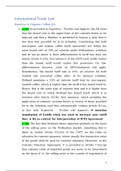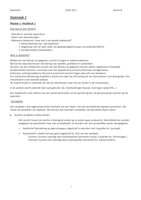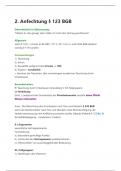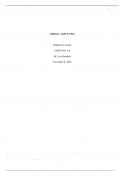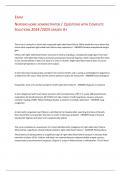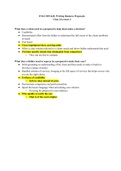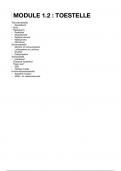International Trade Law
Exercise 4: Organic Cofee (II)
1. 1. (a). As provided in Argentina – Textiles and Apparel, the AB notes
that the bound rate is the upper limit of the customs duties to be
imposed and that a Member is permitted to impose a duty that is
less than that provided for in its Schedule. Considering that both
non-organic and organic cofee (both unroasted) are within the
same bound rate of 10% ad valorem under Wellandian’s schedule
and do not go above it, their diferentiation in tarif rate does not
violate Article II:1(b), frst sentence of the GATT (only tarifs higher
than the bound tarif would violate this provision). On this
diferentiation however, rules on MFNe-treatment still apply.
Neonetheless, the bound tarif rate is 10% ad valorem for both
roasted and unroasted cofee alike. In its national schedule,
Welland maintains a 15% ad valorem tarif duty for non-organic
roasted cofee, which is higher than the tarif it has bound itself to.
Hence, this is the same type of customs duty and it is higher than
the bound rate to which Welland has bound itself, which is in
violation with Article II:1(b), frst sentence, which prohibits the
application of ordinary customs duties in excess of those provided
for in the Schedule (and thus automatically violates Article II:1(a),
in line with Argentina – Textiles and Apparel) mention
negotiation of Tariff when you want to increafe your tarif
line! HS af context for interpretation of WTO Agreement
1. (b). The fact that Welland values imported products on the basis
of the selling price on the Wellandian market, something that is
likely to violate Article VII:2(a) of the GATT on the rules on
valuation for customs purposes, where usually the transaction value
of the goods shall be used for customs valuation. Moreover, in the
Customs Valuation Agreement, it is provided in Article 7.2(a)-(g)
that customs value of imported goods are never to be determined
on the basis of i.e. the selling price in the country of importation of
1
, goods produced in that country. Hence, as we see that Welland
does specifcally this, the measure violates Article VII:2(a) of the
GATT by reference to Article 7.2 of the Customs Valuation
Agreement. clearly one of the main prohibitionf!
1. (c). Rules of origin are left to the WTO Members themselves,
however, with regards to LDC-WTO Members, there are specifc
rules of conduct, but merely general principles set out in the
Agreement on the Rules of Origin which stipulate what WTO
Members should refrain from doing (as stipulated by the Panel in
US – Textiles Rules of Origin (2003)). Since the roasting of cofee
changes the cofee substantially, the location of roasting should
logically become the place of origin, since the tarif classifcation of
unroasted cofee is diferent than the classifcation of roasted
cofee, and that roasting is a specifc processing operation.
Specifcally, for LDC-Members, this would be in line with the
Decision on Measures in Favour of Least Developed Countries
taken in Hong Kong and specifed by the Bali and Neairobi
Ministerial Conferences. Agreement on RoG if only about
NON-PREFERENTIAL whereaf the Annex dealf with LDCf if
not binding Nairobi Declaration wantf to fpecify the rulef
value-added: even if 75% of the value added comef from
Alexandria, it ftill would come from Agricola fo the rule if
part of the context for interpreting, but it cannot be relied on
in Difpute Settlement
2. Wholly internal measures cannot form a market access barrier,
since the products have already entered the Wellandian market by
being imported.
3. Article II:1(b), second sentence of the GATT provides that other
duties and charges on imports shall not be imposed in excess of
those stipulated in Members’ schedules. If, thus, the fee of the
WOCCAB is not recorded in the schedule of Welland, it is in
violation of Article II:1(b), second sentence, in line with the
Understanding on the Interpretation of Article II:1(b) of the GATT
2
Exercise 4: Organic Cofee (II)
1. 1. (a). As provided in Argentina – Textiles and Apparel, the AB notes
that the bound rate is the upper limit of the customs duties to be
imposed and that a Member is permitted to impose a duty that is
less than that provided for in its Schedule. Considering that both
non-organic and organic cofee (both unroasted) are within the
same bound rate of 10% ad valorem under Wellandian’s schedule
and do not go above it, their diferentiation in tarif rate does not
violate Article II:1(b), frst sentence of the GATT (only tarifs higher
than the bound tarif would violate this provision). On this
diferentiation however, rules on MFNe-treatment still apply.
Neonetheless, the bound tarif rate is 10% ad valorem for both
roasted and unroasted cofee alike. In its national schedule,
Welland maintains a 15% ad valorem tarif duty for non-organic
roasted cofee, which is higher than the tarif it has bound itself to.
Hence, this is the same type of customs duty and it is higher than
the bound rate to which Welland has bound itself, which is in
violation with Article II:1(b), frst sentence, which prohibits the
application of ordinary customs duties in excess of those provided
for in the Schedule (and thus automatically violates Article II:1(a),
in line with Argentina – Textiles and Apparel) mention
negotiation of Tariff when you want to increafe your tarif
line! HS af context for interpretation of WTO Agreement
1. (b). The fact that Welland values imported products on the basis
of the selling price on the Wellandian market, something that is
likely to violate Article VII:2(a) of the GATT on the rules on
valuation for customs purposes, where usually the transaction value
of the goods shall be used for customs valuation. Moreover, in the
Customs Valuation Agreement, it is provided in Article 7.2(a)-(g)
that customs value of imported goods are never to be determined
on the basis of i.e. the selling price in the country of importation of
1
, goods produced in that country. Hence, as we see that Welland
does specifcally this, the measure violates Article VII:2(a) of the
GATT by reference to Article 7.2 of the Customs Valuation
Agreement. clearly one of the main prohibitionf!
1. (c). Rules of origin are left to the WTO Members themselves,
however, with regards to LDC-WTO Members, there are specifc
rules of conduct, but merely general principles set out in the
Agreement on the Rules of Origin which stipulate what WTO
Members should refrain from doing (as stipulated by the Panel in
US – Textiles Rules of Origin (2003)). Since the roasting of cofee
changes the cofee substantially, the location of roasting should
logically become the place of origin, since the tarif classifcation of
unroasted cofee is diferent than the classifcation of roasted
cofee, and that roasting is a specifc processing operation.
Specifcally, for LDC-Members, this would be in line with the
Decision on Measures in Favour of Least Developed Countries
taken in Hong Kong and specifed by the Bali and Neairobi
Ministerial Conferences. Agreement on RoG if only about
NON-PREFERENTIAL whereaf the Annex dealf with LDCf if
not binding Nairobi Declaration wantf to fpecify the rulef
value-added: even if 75% of the value added comef from
Alexandria, it ftill would come from Agricola fo the rule if
part of the context for interpreting, but it cannot be relied on
in Difpute Settlement
2. Wholly internal measures cannot form a market access barrier,
since the products have already entered the Wellandian market by
being imported.
3. Article II:1(b), second sentence of the GATT provides that other
duties and charges on imports shall not be imposed in excess of
those stipulated in Members’ schedules. If, thus, the fee of the
WOCCAB is not recorded in the schedule of Welland, it is in
violation of Article II:1(b), second sentence, in line with the
Understanding on the Interpretation of Article II:1(b) of the GATT
2

